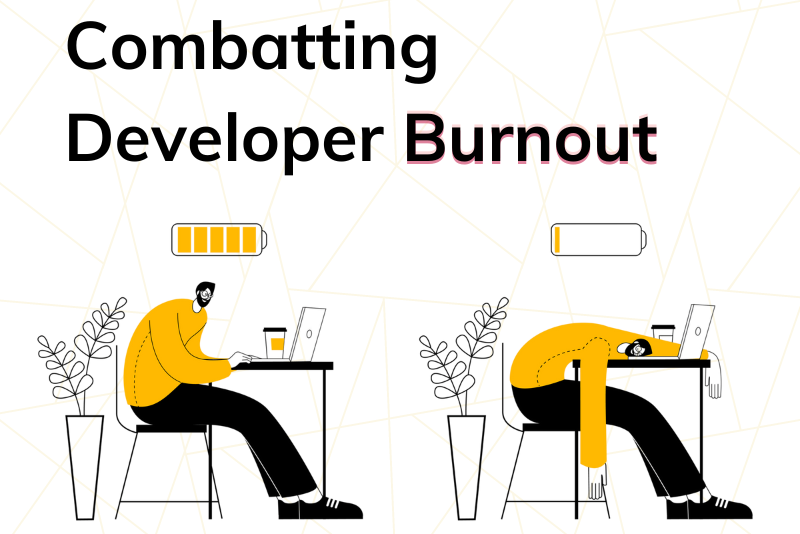How to Recognize and Combat Developer Burnout
Do you remember when you first learned to code? It was fun, magical even, and you were obsessed.
Fast forward to the present day. Do you still feel that spark when you write code? Or is your motivation MIA, lost in the pressures of long hours and the stress of impending deadlines?
This article will cover what causes workplace burnout, how to recognize its early stages, and what to do to combat it!
Happy But Stressed
According to a survey by PayScale, software engineers have a job satisfaction rate of four out of five stars. But you can burn out even in a job you love. The very nature of software development, with its intense mental focus, heavy workloads, never-ending roadmaps, and often under-staffed teams, makes developer burnout a real job hazard. In fact, a study by Haystack Analysis found that 83% of software developers have experienced some level of burnout in the past six to eight months. But you don’t have to become a statistic!
What is Burnout?
Many people think that “stress” and “burnout” mean the same thing. Workplace stress is usually caused by too much work, too much pressure, and too many hours. But stress comes and goes and during a stressful episode, you can imagine feeling better once you get everything under control. And while not everyone who experiences stress will burn out, stress is the largest contributing factor to burnout.
Burnout is all about not having enough – no energy, no motivation, no hope. It’s a chronic state of physical or emotional exhaustion that also involves a sense of reduced accomplishment and loss of personal identity. And, unlike stress, you don’t always recognize burnout.
Learn How to Spot Developer Burnout Risk
Developer burnout isn’t something that happens overnight. One of the best ways to prevent burnout is to learn how to spot the early signs.
- Are you mentally fatigued at the end of the day?
- Are you feeling unappreciated or frustrated?
- Do you have general physical aches and pains?
- Do you dread going to work the next day?
These are all early warning signs that you may be in the early stages of burnout. This is when you need to acknowledge the red flags and take action.
Combatting Developer Burnout
If you find yourself in the early stages of developer burnout it’s important to take the time to address it before your physical and mental health are compromised. These five tips will help get you back on track.
- Sleep. Writing software and insomnia often go hand in hand. Many developers find it difficult to “turn their brains off” at the end of the day, especially if they are stuck on a difficult problem. Re-establishing healthy sleep habits will help restore your energy and your brain power so you can come back more productive.
- Take a break. Hop on TripAdvisor or Airbnb and plan a vacation. Take a day off to relax. Step away from your computer and do something you love. Talk a walk, read a book, call a friend or watch a movie. And when you can’t take a substantial break to do something you enjoy, make sure you are at least getting from your desk at regular intervals – stretch your legs, get a drink, and get your circulation going.
- Spend time learning. I know it might sound counterintuitive but spend time learning a new technology or trying new libraries to rediscover the passion you felt for coding. Keeping things fresh and adding to your list of skills is not only useful in combatting the boredom of working in the same language day after day, but it may also eventually lead to a job promotion.
- Talk to your manager. If you are feeling any of the early warning signs of burnout, speak up! Talk to your manager about responsibilities, resources, workloads, and roadblocks you might be facing in your current projects.
- Up your time management game. Use schedules not only to plan work-related activities but also for time off. Know your limits and what you can reasonably expect to accomplish without overworking yourself. Prioritize so you spend most of your time on important, high-impact tasks. And learn to say no – resist the temptation to take on new projects if your workload is already maxed out!
Whether you are happily coding your days away, starting to struggle with your workload, or in the beginning stages of burning out, it’s important to recognize burnout as a real hazard of the software development job. Check in with yourself regularly to assess whether you may be at risk. And if you are, take action early so you can nip it in the bud and get back to a healthy, happy work life!





